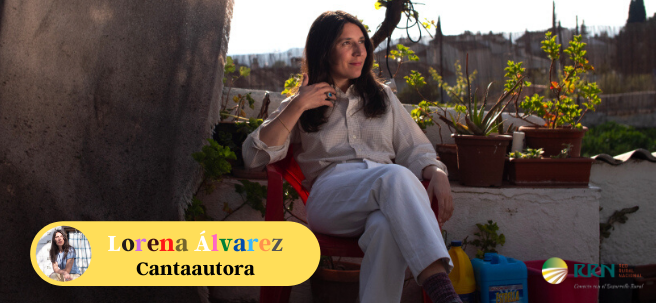
15 de July de 2020
Mujeres
July 15, 2020. Singer Lorena Álvarez (San Antolín de Ibias, Asturias) has just returned from a short vacation in her hometown, after spending quarantine in Madrid, where she was surprised by the pandemic after moving and settling in.
- Singer Lorena Álvarez speaks with the National Rural Network about the pandemic and quarantine, rural music, towns, cities, and the summer ahead.
Lorena, whose latest album, "Colección de canciones sencillas," opened for Julieta Venegas and Nacho Vegas in 2012. A restless artist by nature, she not only composes and sings, but also produces and directs her own music videos and illustrates her albums and website.
Known for making "rural music," Lorena breaks away from labels, but contrasts her musical style with the current urban music scene.
RRN: How do you think the pandemic has changed us?
Lorena Álvarez: It's changed more than us, the world. And that means we have a good opportunity for each of us to decide what we want to do and what we can contribute from our individual perspective. We must be very conscious of how we want to live from now on. Human beings have been given the power to build the best, and that power is being used to destroy everything.
RRN: Has it affected your summer tour?
LA: Yes, but it was my own initiative. I canceled the pending dates that could have been resumed. I don't think the circumstances are right, and I'm at a time when I'd rather work on new music and commissions I have pending.
RRN: Your music is labeled as “rural.” What does that mean exactly?
LA: For me, that label doesn't exist at first. I have my influences, of course, but above all, I follow my instincts when it comes to composing. Of course, if by "rural" the market understands that it's a counterpoint to the type of urban music currently being made, then yes, I do make rural music. After all, being born and living in a village has different connotations than being born in a city.
RRN: Do you think the pandemic has led to a new perspective on the rural world?
LA: Indeed, there's a change in mentality. Lockdown has made us value what's truly important. The world has stopped. And we've been able to see that before, importance was placed on fleeting and apparent things... And beneath that appearance, we see a universal truth we ignored: authenticity, love, and nature. It's logical, then, that people are now looking to the rural world to try to breathe and be happier, freer, and not live in crowded conditions.
RRN: So you are in favor of a return to rural life?
LA: Rural life isn't flawed. But I don't idealize it. The ideal would be to live in a village with its quality of life, but also with the basic services of the city: communication, connections, education, healthcare... Living in a village also brings many problems. There's a lack of jobs, aging, and few children in school. How can we achieve a balance between the two?
RRN: What will this summer be like for you?
LA: Well, my summer will be rural! (laughs). After lockdown, I need some contact with nature, so I'm going to an artist residency in the Pyrenees to record new music that I've been commissioned to do.









